 Accueil Gizmodo Buzz Certains mélangent vraiment tout sur l’internet Non, il n'est pas question des comploteurs ni des trolls (qui sont cependant légion sur la toile), mais d'un site web en particulier qui mélange tout: les types de données (textes, images, sons ou vidéos) et les genres (microblog, marque-page, mémo, album). La particularité du site est que ce mélange des genres est volontaire et recherchée: c’est même le concept du site Kweeper. Chacun peut ainsi venir publier kweeper sur ce grand mur virtuel imaginé par Charles Elé, un informaticien lyonnais intéressé depuis longtemps par les formes d’expressions de ses contemporains sur la toile. Il est vrai que le sujet est suffisamment riche pour pouvoir alimenter bon nombre de thèses de doctorat. Dernières Questions sur Gizmodo Help
Accueil Gizmodo Buzz Certains mélangent vraiment tout sur l’internet Non, il n'est pas question des comploteurs ni des trolls (qui sont cependant légion sur la toile), mais d'un site web en particulier qui mélange tout: les types de données (textes, images, sons ou vidéos) et les genres (microblog, marque-page, mémo, album). La particularité du site est que ce mélange des genres est volontaire et recherchée: c’est même le concept du site Kweeper. Chacun peut ainsi venir publier kweeper sur ce grand mur virtuel imaginé par Charles Elé, un informaticien lyonnais intéressé depuis longtemps par les formes d’expressions de ses contemporains sur la toile. Il est vrai que le sujet est suffisamment riche pour pouvoir alimenter bon nombre de thèses de doctorat. Dernières Questions sur Gizmodo Help
Certains mélangent vraiment tout sur l’internet - Gizmodo -
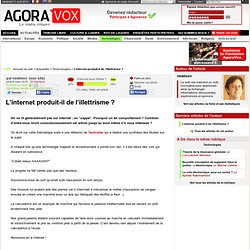
L'internet produit-il de l'illettrisme ? - AgoraVox le média cit
On ne lit généralement pas sur Internet ; on “zappe”. Pourquoi un tel comportement ? Combien d’entre-vous liront consciencieusement cet article jusqu’au bout même s’il vous intéresse ? On écrit sur cette thématique suite à une réflexion de Techradar qui a réalisé une synthèse des études sur le sujet. A chaque fois qu’une technologie majeure et révolutionnaire a pointé son nez, il s’est élevé des voix qui disaient en substance : “C’était mieux AAAAVANT” Le progrès ne fait certes pas que des heureux... Souvenons-nous du sort qu’avait subi Vaucanson en son temps. Des tisseurs lui avaient jeté des pierres car il cherchait à mécaniser le métier (Vaucanson se vengea ensuite en créant une machine avec un âne qui fabriquait des étoffes à fleur...). La calculatrice est un exemple de machine qui favorise la paresse intellectuelle tout en restant un outil évidemment très utile. Revenons-en à Internet ! Certains ont crié très tôt qu’Internet ferait de nos cerveaux une véritable gelée anglaise à terme.
wls
Windows Live Spaces n’est plus. Voilà plusieurs mois que Microsoft annonçait la fin de Windows Live Spaces. Si vous aviez un blog WLS, vous avez dû recevoir un message vous annonçant le transfert vers le système de blogs WordPress. Si vous avez loupé cette opération, il est maintenant trop tard. Voyez mon site sur le système de blog WordPress . Un blog est un site Web sur lequel vous ajoutez continuellement des éléments. Cet dossier a été réécrit pour tenir compte des modifications apportées à l’interface à fin 2008. Plan : - Principes. - S’inscrire au service et créer l’espace perso. - Quelques réglages de bases. - Profil et informations personnelles. - Créer des billets (Mac et PC). - Créer des billets avec Windows Live Writer (PC) . - Photos et vidéos sur Mac . - Photos et vidéos sur PC . - Les commentaires aux billets. - Créer des listes. - Personnaliser son espace . - Le SkyDrive . Rampe de lancement 23: en format A4 PDF - en format livret PDF .
cours-et-tutoriaux-internet
Accueil » Mozilla FireFox Activer la navigation par onglet Une des principales évolutions de Mozilla est la navigation par onglet. En effet, au lieu d'avoir 5 fenêtres dans votre barre des taches vous... Activer le gestionnaire de formulaires Vous avez remplissez beaucoup de formulaire sur le web et vous souhaiteriez informer certains champs qu'une seule fois? Activer le gestionnaire de mots de passe Vous avez beaucoup de mots de passe et vous souhaitez les saisirs qu'une seule fois? Activer les cookies Par défaut les cookies sont activés dans mozilla. Activer l’aperçu des onglets “Aero Peek” sur Windows 7 [3.6+] Bien que les versions 3.6 et ultérieure de Mozilla Firefox supporte la fonction d’aperçue des onglets “Aero Peek” de Windows Seven, c’est dernière n’est... Afficher une grille de tous les onglets ouverts [3.6+] Vous désirez avoir un aperçu rapide de tous vos onglets ouverts un peu à la façon d’internet explorer 8 et 9? Afficher vos favoris en "sidebar" style Explorer Bloquer les popups
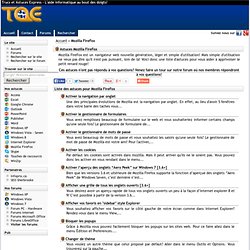
Mozilla FireFox
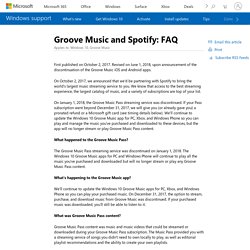
Internet-radiogids
First published on October 2, 2017. Revised on June 1, 2018, upon announcement of the discontinuation of the Groove Music iOS and Android apps. On October 2, 2017, we announced that we'd be partnering with Spotify to bring the world’s largest music streaming service to you. We know that access to the best streaming experience, the largest catalog of music, and a variety of subscriptions are top of your list. On January 1, 2018, the Groove Music Pass streaming service was discontinued. If your Pass subscription went beyond December 31, 2017, we will give you (or already gave you) a prorated refund or a Microsoft gift card (see timing details below). What happened to the Groove Music Pass? The Groove Music Pass streaming service was discontinued on January 1, 2018. What's happening to the Groove Music app? We’ll continue to update the Windows 10 Groove Music apps for PC, Xbox, and Windows Phone so you can play your purchased music. What was Groove Music Pass content? No. No. No. No. Yes. No.
Internet-radiogids
The Internet Underground Music Archive
Vanilla Internet Services
Wizualizacja różnych dróg w części Internetu Internet (skrótowiec od ang. inter-network, dosłownie "między-sieć") – ogólnoświatowa sieć komputerowa, określana również jako sieć sieci[1]. W znaczeniu informatycznym Internet to przestrzeń adresów IP przydzielonych hostom i serwerom połączonym za pomocą urządzeń sieciowych, takich jak karty sieciowe, modemy i koncentratory, komunikujących się za pomocą protokołu internetowego z wykorzystaniem infrastruktury telekomunikacyjnej. Historia Internetu[edytuj | edytuj kod] Początki Internetu wiążą się z powstaniem sieci rozległej ARPANET i sięgają końca lat 60. Terminologia[edytuj | edytuj kod] Internet a WWW[edytuj | edytuj kod] Internet w ogólnym znaczeniu to sieć komputerowa, czyli wiele połączonych ze sobą komputerów, zwanych również hostami, natomiast WWW to usługa internetowa. Rozróżnienie pomiędzy siecią a usługami odwołuje się do pojęcia protokołu internetowego, będących określonym zbiorem protokołów komunikacyjnych. Przypisy
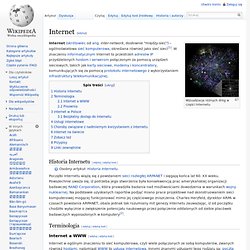
Internet
Internet
Internet
Internet Marketing Services & Company
Internet Marketing UK by SME Marketing - Internet Marketing Business
Internet Marketing, Internet Marketing UK, Internet Marketing Services - SAIM
Promouvoir un usage raisonné et éthique d'internet
Novembre 2017 L'idée révolutionnaire En 1962, alors que le communisme faisait force, l'US Air Force demande à un petit groupe de chercheurs de créer un réseau de communication militaire capable de résister à une attaque nucléaire. Le concept de ce réseau reposait sur un système décentralisé, permettant au réseau de fonctionner malgré la destruction d'une une ou plusieurs machines. Le modèle de Baran Paul Baran est considéré comme un des acteurs principaux de la création d'Internet. En août 1969, indépendamment de tout objectif militaire, le réseau expérimental ARPANET fut créé par l'ARPA (Advanced Research Projects Agency dépendant du DOD, Department of Defense) afin de relier quatre instituts universitaires : Le Stanford Institute ; L'université de Californie à Los Angeles ; L'université de Californie à Santa Barbara ; L'université d'Utah. Le réseau ARPANET est aujourd'hui considéré comme le réseau précurseur d'internet. Le courrier électronique En juillet 1972, Lawrence G. Le protocole TCP
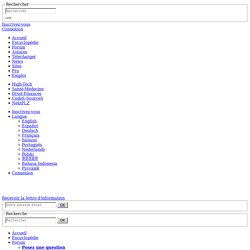
Histoire d'Internet
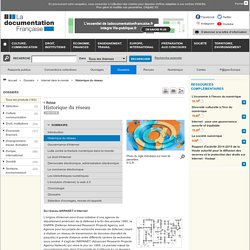 Du réseau ARPANET à Internet Arpanet : 88 ordinateurs connectés entre eux, 1982. © Field museum/Joyce Reynolds Agrandir l'image L'origine d'internet vient d'une initiative d’une agence du département américain de la défense à la fin des années 1960, la DARPA (Defense Advanced Research Projects Agency, soit Agence pour les projets de recherche avancée de défense) visant à réaliser un réseau de transmission de données (transfert de paquets) à grande distance entre différents centres de recherche sous contrat. La connexion entre tous les réseaux existants, c'est-à-dire "l'internet" proprement dit, n'est devenue possible qu'avec la définition de normes communes. En 1970, a été créé un premier protocole de communication, le NCP (Network Communication Protocol). La création du World Wide Web Internet s’ouvre véritablement au grand public avec la création, lors du Centre européen pour la recherche nucléaire (CERN), en 1991, du World Wide Web, par Tim Berners-Lee. L’essor d’internet
Du réseau ARPANET à Internet Arpanet : 88 ordinateurs connectés entre eux, 1982. © Field museum/Joyce Reynolds Agrandir l'image L'origine d'internet vient d'une initiative d’une agence du département américain de la défense à la fin des années 1960, la DARPA (Defense Advanced Research Projects Agency, soit Agence pour les projets de recherche avancée de défense) visant à réaliser un réseau de transmission de données (transfert de paquets) à grande distance entre différents centres de recherche sous contrat. La connexion entre tous les réseaux existants, c'est-à-dire "l'internet" proprement dit, n'est devenue possible qu'avec la définition de normes communes. En 1970, a été créé un premier protocole de communication, le NCP (Network Communication Protocol). La création du World Wide Web Internet s’ouvre véritablement au grand public avec la création, lors du Centre européen pour la recherche nucléaire (CERN), en 1991, du World Wide Web, par Tim Berners-Lee. L’essor d’internet
Historique du réseau - Internet dans le monde
A WWW grafikus bemutatása, az információs struktúra a Wikipédia körül, ami a hiperlinkeket reprezentálja. Az internet olyan globális számítógépes hálózatok hálózata, ami az internetprotokoll (IP) révén felhasználók milliárdjait kapcsolja össze és lehetővé teszi olyan elosztott rendszerek működtetését, mint például a WWW (World Wide Web). Az internet kifejezés nemzetközileg elterjedt szó, az angol eredetű internetwork szóból ered, ami magyarul leginkább ’hálózatok hálózata’-ként adható vissza, szó szerint hálózatok közötti-t jelent. Az internet az egész világot körülölelő számítógép-hálózat, hatalmas rendszer, amely kisebb számítógép-hálózatokat fog össze. Az internet olyan gyorsan növekszik, hogy minden erre vonatkozó számadat pár hónap alatt elavul. Az internetet felépítő és szabályozó protokollok mindenki számára hozzáférhetőek, ezeket rengeteg gyártó támogatja: mindez a hatékony szabványosítás eredményének is betudható. Az internetnek nincs központi épülete. Története[szerkesztés]
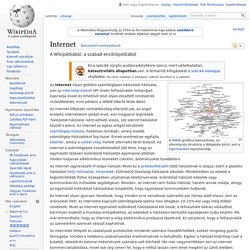
Internet
Internet Growth Statistics - the Global Village Online
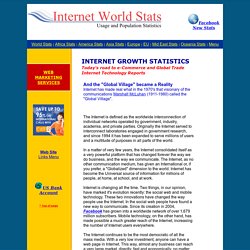 INTERNET GROWTH STATISTICSToday's road to e-Commerce and Global Trade Internet Technology ReportsHistory and Growth of the Internet from 1945 to 1995Before getting into the numbers, let's take a look at the fascinating history of the Internet, from 1945 to 1995, by courtesy of the World Wide Web Consortium (W3C). History and Growth of the Internet from 1995 till TodayToday the Internet continues to grow day by day making McLuhan's Global Village a reality. The following table shows the incredibly fast evolution of the Internet from 1995 till the present time: Statistics of the InternetThe Internet has made distances shorter and the world smaller.
INTERNET GROWTH STATISTICSToday's road to e-Commerce and Global Trade Internet Technology ReportsHistory and Growth of the Internet from 1945 to 1995Before getting into the numbers, let's take a look at the fascinating history of the Internet, from 1945 to 1995, by courtesy of the World Wide Web Consortium (W3C). History and Growth of the Internet from 1995 till TodayToday the Internet continues to grow day by day making McLuhan's Global Village a reality. The following table shows the incredibly fast evolution of the Internet from 1995 till the present time: Statistics of the InternetThe Internet has made distances shorter and the world smaller.
Number of Internet Users (2016)
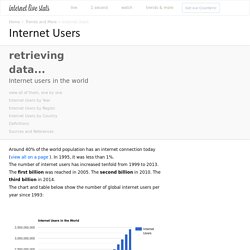 Around 40% of the world population has an internet connection today (view all on a page ). In 1995, it was less than 1%. The number of internet users has increased tenfold from 1999 to 2013. Users * estimate for July 1, 2016 ** Internet User = individual who can access the Internet at home, via any device type and connection. Source: Internet Live Stats (www.InternetLiveStats.com) Elaboration of data by International Telecommunication Union (ITU), World Bank, and United Nations Population Division. Internet Users by Region As of July 1, 2013: Oceania Source: Internet Live Stats (elaboration of data by International Telecommunication Union (ITU) and United Nations Population Division). Internet Users by Country In 2014, nearly 75% (2.1 billion) of all internet users in the world (2.8 billion) live in the top 20 countries. An Internet User is defined as an individual who has access to the Internet at home, via computer or mobile device. Definitions User Internet Sources References
Around 40% of the world population has an internet connection today (view all on a page ). In 1995, it was less than 1%. The number of internet users has increased tenfold from 1999 to 2013. Users * estimate for July 1, 2016 ** Internet User = individual who can access the Internet at home, via any device type and connection. Source: Internet Live Stats (www.InternetLiveStats.com) Elaboration of data by International Telecommunication Union (ITU), World Bank, and United Nations Population Division. Internet Users by Region As of July 1, 2013: Oceania Source: Internet Live Stats (elaboration of data by International Telecommunication Union (ITU) and United Nations Population Division). Internet Users by Country In 2014, nearly 75% (2.1 billion) of all internet users in the world (2.8 billion) live in the top 20 countries. An Internet User is defined as an individual who has access to the Internet at home, via computer or mobile device. Definitions User Internet Sources References
unnamed pearl
unnamed pearl
unnamed pearl
Main » TERM » I » By Vangie Beal The Internet is generally defined as a global network connecting millions of computers. More than 190 countries are linked into exchanges of data, news and opinions. The Internet is Decentralized Unlike online services, which are centrally controlled, by design, the Internet is decentralized. Is Web and Internet the Same? The Internet is not synonymous with World Wide Web. Recommended Reading: The Difference Between the Internet and World Wide Web. Who Owns the Internet? No one actually owns the Internet, and no single person or organization controls the Internet in its entirety. Number of Worldwide Users According to Internet Live Stats, as of August 12, 2016 there was an estimated 3,432,809,100 Internet users worldwide. In September 2014, the total number of websites with a unique hostname online exceeded 1 billion.
What is the Internet? Webopedia Definition
Introduced in the 1960s, the Internet became widely accessible by the 1990s. Over the years, many Internet-related words entered mainstream usage, but given the pace of change, some terms gradually fell out of favor. Some new terms that at first seemed aptly modern quickly turned out to be inadequate to encompass what the Internet rapidly became.
Internet
The term internet, spelled with a lower case "i," has always meant a large network made up of smaller networks. Today, the term mostly refers to the global Internet, properly spelled with an upper case "I." The global Internet comprises a billion Web, e-mail and related servers in more than 100 countries. Originally developed for the U.S. military, it became widely used for academic and commercial research with access to unpublished data and journals on many subjects. Today, not only is the "Net" the largest source of information on every subject known to humankind, it is also the largest source of "misinformation." In addition, it has become a global mail-order catalog and video transport. The Original Internet The Internet started in 1969 as the ARPAnet. Modest Beginnings These four nodes were drawn in 1969 showing the University of California at Berkeley and Los Angeles, SRI International and the University of Utah. How the Internet Is Connected
Internet dictionary definition | Internet defined
espace pédagogique > disciplines du second degré > enseignements informatiques > enseignement > snt mis à jour le 11/07/2019 Quelques définitions et notions de vocabulaire de l’Internet mots clés : snt, internet, TCP/IP, ADSL, protocole 1) Technologie de communication - Protocole ADSL (asymmetric digital subscriber line) : Technique de communication asymétrique (la réception des données est plus rapide que l’envoi de données) utilisée sur les lignes téléphoniques pour fournir des données numériques. 2) Réseaux Serveur : Ordinateur qui fournit des services (web, mail, DNS, streaming, etc.) 3) Licences et droits Droits d’auteurs : Droits qui protègent la création d’une personne. information(s) pédagogique(s) niveau : tous niveaux, 2nde type pédagogique : démarche pédagogique public visé : non précisé, élève, enseignant contexte d'usage : classe référence aux programmes : documents complémentaires page précédente | haut de page enseignements informatiques - Rectorat de l'Académie de Nantes
Portail pédagogique : enseignements informatiques - lexique de l'internet
Comprendre le fonctionnement d'Internet en 5 minutes
Le grand méchant darknet
Cuándo nació internet? Historia y evolució
Internet


 Accueil Gizmodo Buzz Certains mélangent vraiment tout sur l’internet Non, il n'est pas question des comploteurs ni des trolls (qui sont cependant légion sur la toile), mais d'un site web en particulier qui mélange tout: les types de données (textes, images, sons ou vidéos) et les genres (microblog, marque-page, mémo, album). La particularité du site est que ce mélange des genres est volontaire et recherchée: c’est même le concept du site Kweeper. Chacun peut ainsi venir publier kweeper sur ce grand mur virtuel imaginé par Charles Elé, un informaticien lyonnais intéressé depuis longtemps par les formes d’expressions de ses contemporains sur la toile. Il est vrai que le sujet est suffisamment riche pour pouvoir alimenter bon nombre de thèses de doctorat. Dernières Questions sur Gizmodo Help
Certains mélangent vraiment tout sur l’internet - Gizmodo -
Accueil Gizmodo Buzz Certains mélangent vraiment tout sur l’internet Non, il n'est pas question des comploteurs ni des trolls (qui sont cependant légion sur la toile), mais d'un site web en particulier qui mélange tout: les types de données (textes, images, sons ou vidéos) et les genres (microblog, marque-page, mémo, album). La particularité du site est que ce mélange des genres est volontaire et recherchée: c’est même le concept du site Kweeper. Chacun peut ainsi venir publier kweeper sur ce grand mur virtuel imaginé par Charles Elé, un informaticien lyonnais intéressé depuis longtemps par les formes d’expressions de ses contemporains sur la toile. Il est vrai que le sujet est suffisamment riche pour pouvoir alimenter bon nombre de thèses de doctorat. Dernières Questions sur Gizmodo Help
Certains mélangent vraiment tout sur l’internet - Gizmodo -
 L'internet produit-il de l'illettrisme ? - AgoraVox le média cit
On ne lit généralement pas sur Internet ; on “zappe”. Pourquoi un tel comportement ? Combien d’entre-vous liront consciencieusement cet article jusqu’au bout même s’il vous intéresse ? On écrit sur cette thématique suite à une réflexion de Techradar qui a réalisé une synthèse des études sur le sujet. A chaque fois qu’une technologie majeure et révolutionnaire a pointé son nez, il s’est élevé des voix qui disaient en substance : “C’était mieux AAAAVANT” Le progrès ne fait certes pas que des heureux... Souvenons-nous du sort qu’avait subi Vaucanson en son temps. Des tisseurs lui avaient jeté des pierres car il cherchait à mécaniser le métier (Vaucanson se vengea ensuite en créant une machine avec un âne qui fabriquait des étoffes à fleur...). La calculatrice est un exemple de machine qui favorise la paresse intellectuelle tout en restant un outil évidemment très utile. Revenons-en à Internet ! Certains ont crié très tôt qu’Internet ferait de nos cerveaux une véritable gelée anglaise à terme.
L'internet produit-il de l'illettrisme ? - AgoraVox le média cit
On ne lit généralement pas sur Internet ; on “zappe”. Pourquoi un tel comportement ? Combien d’entre-vous liront consciencieusement cet article jusqu’au bout même s’il vous intéresse ? On écrit sur cette thématique suite à une réflexion de Techradar qui a réalisé une synthèse des études sur le sujet. A chaque fois qu’une technologie majeure et révolutionnaire a pointé son nez, il s’est élevé des voix qui disaient en substance : “C’était mieux AAAAVANT” Le progrès ne fait certes pas que des heureux... Souvenons-nous du sort qu’avait subi Vaucanson en son temps. Des tisseurs lui avaient jeté des pierres car il cherchait à mécaniser le métier (Vaucanson se vengea ensuite en créant une machine avec un âne qui fabriquait des étoffes à fleur...). La calculatrice est un exemple de machine qui favorise la paresse intellectuelle tout en restant un outil évidemment très utile. Revenons-en à Internet ! Certains ont crié très tôt qu’Internet ferait de nos cerveaux une véritable gelée anglaise à terme.
 Mozilla FireFox
Mozilla FireFox
 Internet-radiogids
First published on October 2, 2017. Revised on June 1, 2018, upon announcement of the discontinuation of the Groove Music iOS and Android apps. On October 2, 2017, we announced that we'd be partnering with Spotify to bring the world’s largest music streaming service to you. We know that access to the best streaming experience, the largest catalog of music, and a variety of subscriptions are top of your list. On January 1, 2018, the Groove Music Pass streaming service was discontinued. If your Pass subscription went beyond December 31, 2017, we will give you (or already gave you) a prorated refund or a Microsoft gift card (see timing details below). What happened to the Groove Music Pass? The Groove Music Pass streaming service was discontinued on January 1, 2018. What's happening to the Groove Music app? We’ll continue to update the Windows 10 Groove Music apps for PC, Xbox, and Windows Phone so you can play your purchased music. What was Groove Music Pass content? No. No. No. No. Yes. No.
Internet-radiogids
First published on October 2, 2017. Revised on June 1, 2018, upon announcement of the discontinuation of the Groove Music iOS and Android apps. On October 2, 2017, we announced that we'd be partnering with Spotify to bring the world’s largest music streaming service to you. We know that access to the best streaming experience, the largest catalog of music, and a variety of subscriptions are top of your list. On January 1, 2018, the Groove Music Pass streaming service was discontinued. If your Pass subscription went beyond December 31, 2017, we will give you (or already gave you) a prorated refund or a Microsoft gift card (see timing details below). What happened to the Groove Music Pass? The Groove Music Pass streaming service was discontinued on January 1, 2018. What's happening to the Groove Music app? We’ll continue to update the Windows 10 Groove Music apps for PC, Xbox, and Windows Phone so you can play your purchased music. What was Groove Music Pass content? No. No. No. No. Yes. No.
 Internet
Internet
 Histoire d'Internet
Histoire d'Internet
 Du réseau ARPANET à Internet Arpanet : 88 ordinateurs connectés entre eux, 1982. © Field museum/Joyce Reynolds Agrandir l'image L'origine d'internet vient d'une initiative d’une agence du département américain de la défense à la fin des années 1960, la DARPA (Defense Advanced Research Projects Agency, soit Agence pour les projets de recherche avancée de défense) visant à réaliser un réseau de transmission de données (transfert de paquets) à grande distance entre différents centres de recherche sous contrat. La connexion entre tous les réseaux existants, c'est-à-dire "l'internet" proprement dit, n'est devenue possible qu'avec la définition de normes communes. En 1970, a été créé un premier protocole de communication, le NCP (Network Communication Protocol). La création du World Wide Web Internet s’ouvre véritablement au grand public avec la création, lors du Centre européen pour la recherche nucléaire (CERN), en 1991, du World Wide Web, par Tim Berners-Lee. L’essor d’internet
Historique du réseau - Internet dans le monde
Du réseau ARPANET à Internet Arpanet : 88 ordinateurs connectés entre eux, 1982. © Field museum/Joyce Reynolds Agrandir l'image L'origine d'internet vient d'une initiative d’une agence du département américain de la défense à la fin des années 1960, la DARPA (Defense Advanced Research Projects Agency, soit Agence pour les projets de recherche avancée de défense) visant à réaliser un réseau de transmission de données (transfert de paquets) à grande distance entre différents centres de recherche sous contrat. La connexion entre tous les réseaux existants, c'est-à-dire "l'internet" proprement dit, n'est devenue possible qu'avec la définition de normes communes. En 1970, a été créé un premier protocole de communication, le NCP (Network Communication Protocol). La création du World Wide Web Internet s’ouvre véritablement au grand public avec la création, lors du Centre européen pour la recherche nucléaire (CERN), en 1991, du World Wide Web, par Tim Berners-Lee. L’essor d’internet
Historique du réseau - Internet dans le monde
 Internet
Internet
 INTERNET GROWTH STATISTICSToday's road to e-Commerce and Global Trade Internet Technology ReportsHistory and Growth of the Internet from 1945 to 1995Before getting into the numbers, let's take a look at the fascinating history of the Internet, from 1945 to 1995, by courtesy of the World Wide Web Consortium (W3C). History and Growth of the Internet from 1995 till TodayToday the Internet continues to grow day by day making McLuhan's Global Village a reality. The following table shows the incredibly fast evolution of the Internet from 1995 till the present time: Statistics of the InternetThe Internet has made distances shorter and the world smaller.
INTERNET GROWTH STATISTICSToday's road to e-Commerce and Global Trade Internet Technology ReportsHistory and Growth of the Internet from 1945 to 1995Before getting into the numbers, let's take a look at the fascinating history of the Internet, from 1945 to 1995, by courtesy of the World Wide Web Consortium (W3C). History and Growth of the Internet from 1995 till TodayToday the Internet continues to grow day by day making McLuhan's Global Village a reality. The following table shows the incredibly fast evolution of the Internet from 1995 till the present time: Statistics of the InternetThe Internet has made distances shorter and the world smaller.
 Around 40% of the world population has an internet connection today (view all on a page ). In 1995, it was less than 1%. The number of internet users has increased tenfold from 1999 to 2013. Users * estimate for July 1, 2016 ** Internet User = individual who can access the Internet at home, via any device type and connection. Source: Internet Live Stats (www.InternetLiveStats.com) Elaboration of data by International Telecommunication Union (ITU), World Bank, and United Nations Population Division. Internet Users by Region As of July 1, 2013: Oceania Source: Internet Live Stats (elaboration of data by International Telecommunication Union (ITU) and United Nations Population Division). Internet Users by Country In 2014, nearly 75% (2.1 billion) of all internet users in the world (2.8 billion) live in the top 20 countries. An Internet User is defined as an individual who has access to the Internet at home, via computer or mobile device. Definitions User Internet Sources References
Around 40% of the world population has an internet connection today (view all on a page ). In 1995, it was less than 1%. The number of internet users has increased tenfold from 1999 to 2013. Users * estimate for July 1, 2016 ** Internet User = individual who can access the Internet at home, via any device type and connection. Source: Internet Live Stats (www.InternetLiveStats.com) Elaboration of data by International Telecommunication Union (ITU), World Bank, and United Nations Population Division. Internet Users by Region As of July 1, 2013: Oceania Source: Internet Live Stats (elaboration of data by International Telecommunication Union (ITU) and United Nations Population Division). Internet Users by Country In 2014, nearly 75% (2.1 billion) of all internet users in the world (2.8 billion) live in the top 20 countries. An Internet User is defined as an individual who has access to the Internet at home, via computer or mobile device. Definitions User Internet Sources References